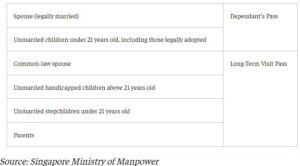Last week, Singapore launched a new work permit, Overseas Networks and Expertise (ONE), that makes it easier for companies to hire expats.
The new permit will allow foreigners earning a minimum S$30,000 per month to secure a five-year work pass, with a provision to allow their dependents to seek employment.
Exceptional individuals in sports, arts, science and academia who don’t meet the salary criteria are also eligible. Criteria for these applicants are yet to be announced.
“Both businesses and talent are searching for safe and stable places to invest, live and work in. Singapore is such a place,” Singapore’s Manpower Minister Tan See Leng said.
Singapore won’t limit the number of applicants for its newest work permit. “What we are really hoping to bring to Singapore are the rainmakers,” Tan said, referring to the efforts to attract leaders in fields across science, technology, engineering and math, as well as finance, arts, culture and sports. “It is an offensive strategy for us.”
The new work permit comes into effect from January 1, 2023.
Eligibility criteria
Existing work pass holders and overseas candidates can apply if they meet either of the salary criteria below:
Earn a fixed monthly salary of at least S$30,000, or its equivalent in foreign currency, within the last 1 year.
Will earn a fixed monthly salary of at least S$30,000 under their future employer based in Singapore.
What is an ‘established company’?
For a company to be considered established, it must have a market capitalization of at least US$500 million or annual revenue of at least US$200 million.
Can you renew the ONE pass?
The Overseas Networks & Expertise Pass is renewable for 5 years each time. To be eligible for renewal, the pass holder must meet either of the following:
Earn a fixed monthly salary of at least S$30,000 on average over the past 5 years
Started and is operating a Singapore-based company that employs at least 5 locals, each earning at least S$5,000.
Started and is operating a Singapore-based company that employs at least 5 locals, each earning at least S$5,000.
Can you bring your family?
To bring your family in, you need to apply for the respective passes:
To bring your family in, you need to apply for the respective passes:
